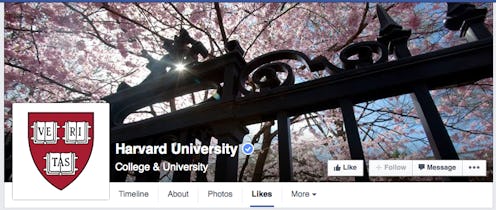News
Are Harvard's Facebook Friends All Bots?

Surely a school like Harvard University, considered one of the most prestigious academic institutions in the world, would have a popular presence on Facebook. But, wait a minute — maybe not this popular. An investigation into Harvard's Facebook account has revealed that three million of its "likes" could be fake. That's three million of, um, 3.3 million. Did Harvard have a hand in this? Or are they the victims of those pesky Facebook trolls known as click farms?
Lenny Teytelman, founder of Zappylab, a company that makes apps for research scientists, conducted an investigation into Harvard's Facebook page and found that a large portion of its likers could be bogus. Many of the likes could even come from fake accounts. Teytelman formed this theory based on the location of an inordinately high number of Harvard's "likers": The most engaged likers on Harvard's page live in the Bangladeshi capital of Dhaka, which is known to be a major headquarters for click farms.
Another clue signifying possible fraudulent activity is Harvard's disproportionate number of likes compared to other prominent universities' Facebook likes. Teytelman created a chart that clearly shows this discrepancy.
Not only does Harvard have a significantly higher number of likes, they're also from locations outside of the university
Just What Are Click Farms?
The Washington Post calls click farms "the new sweatshops." Instead of sewing machines, workers sit at computers and like pages, watch videos, and retweet to increase social engagement for clients. These clients are often celebrities, bands, businesses, and even the U.S. State Department, who pay these companies for bundles of likes and followers. A typical rate is $75 for 1,000 likes.
According to the Associated Press, Dhaka is an international hub for click farms. Shaiful Islam, CEO of Dhaka-based social media promotion firm Unique IT World, told the AP about his workers, who manually click on pages, "Those accounts are not fake, they were genuine." Sure, they might have been real people sitting at a computer and clicking the thumbs-up button, but they sure as hell aren't Harvard alumni or enthusiasts.
One could argue that when you actively campaign for more followers, you're bound to get people from all over, many of which never went to Harvard or even have any interest in the university. This may not affect an academic institution like Harvard, but irrelevant engagement from paid click farms make it difficult for advertisers to determine how many of its ad impressions are legit.
When an entire industry is based on targeting specific markets and demographics, these floods of fake likes hurt advertisers' efforts and render their ads useless.
But Let's Remember Where Facebook Started
One important thing to remember here that could unravel Teytelman's entire argument (at least partly) is that Facebook was born at Harvard. Mark Zuckerberg started the social media site from Harvard's campus in 2004 when he was a student there. Initially, Facebook was only limited to Harvard students before it expanded to other universities in the Boston area, then universities all over, and finally to the entire world.
Thus, it's safe to assume that Harvard probably did have a leg up over the competition, or at least a head start, in terms of its number of likes. However, that still doesn't explain the vast majority of its likes coming from Dhaka.
In his blog, Teytelman ponders:
The most stunning example here is Harvard with 3.3 million "likes". Probably about three million of these are fakes. I just hope they did not pay for this, like we did on PubChase [3]. If the cost per "like" is similar to ours ($50-$100 per thousand), Harvard might have paid Facebook between $150,000-$300,000 for fake likes [4].
It's hard to imagine an esteemed university like Harvard paying these social media sweatshops to up their engagement numbers, but at least it's clearly not the only reputable school that would fit Teytelman's theory.
Images: anothersb.blogspot.com/Lenny Teytelman